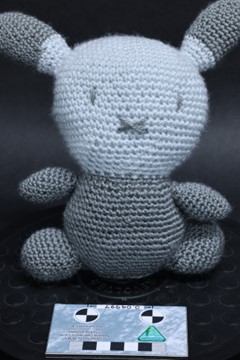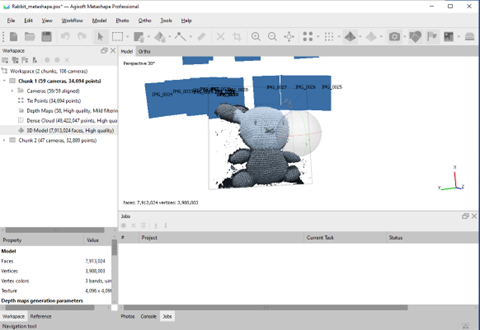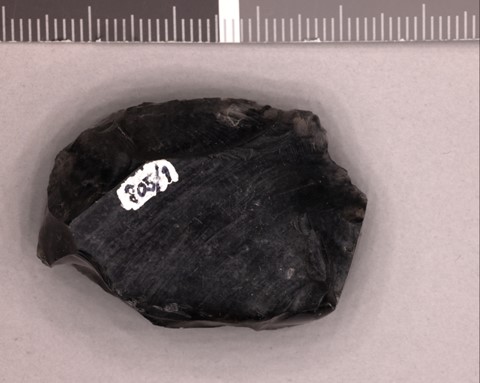Hi, I’m Heide, a second year English Undergraduate. I first encountered the Exeter Digital Humanities Lab during the Festival of Discovery after my first year, but I had already unconsciously experienced Digital Humanities throughout my degree, through online resources such as EEBO (Early English Books Online), The Hardy Correspondents and many other archive websites that I used to research primary sources.
My first hands on experience with digital humanities was during my year one Rethinking Shakespeare module (EAS1041), where we used TEI text encoding to combine differences in Folio and Quarto texts for scholarly consideration. The digitally encoded text provides a more interactive text for study, as different textual variants can be easily seen and more equally considered. The accessibility of the digital texts and the significant scholarly applications inspired me to look further into the previously unknown field of digital humanities by applying to be an intern.
At the start of my internship, I had little technical knowledge about digital photography and technology, however, the DH Lab provided all the training basics. Every week I enjoyed learning new things: Basic Camera skills, Photogrammetry, RTI (Reflectance Transformation Imagery), 3D Modelling and Printing, Photoshop, Audio and Visual recording and editing… The list really does go on! I loved all of the training across the lab and attempted to partake in as many varied projects as I could throughout my internship. One of our training sessions was on photogrammetry, where we brought in our own objects to produce a model. I brought in one of my crochet projects – a kind of awkward looking rabbit (who can be found on one of the Digital Humanities information slides in the Breakout space!). The software wasn’t a great fan of the object, and fabric itself is not the best suited to photogrammetry, so it turned out a little bit wonky (as seen below).
My first projects consisted of 2D digitization in Lab 1, using the A0 copystand. I digitized many letters , and I still enjoy discussing the adorable wax seals to this day. The experience of touching and reading documents and artefacts that would commonly be sealed away in a private collection or museum is such an amazing and interesting experience. I also helped to digitise a collection of Arabic postcards and documents and the Exeter University Fine Art Committee documents. I also used Lab 1 to photograph and reverse negatives of Arabic documents for study in the Lawforms project. Alongside the other interns I helped with inbox and reception management, as well as social media contributions for the Lab and university projects, such as promotional material for the Famine Tales Project.
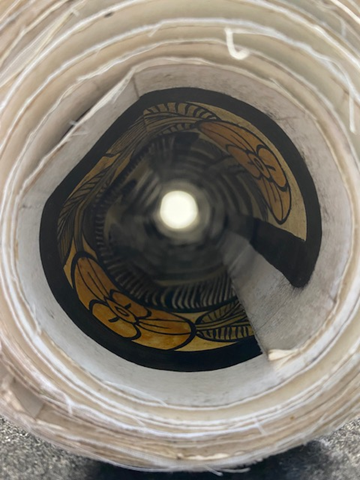
I also worked on digitising cassette tapes of interviews with Devonshire farmers to convert them into a digital format using the Audio-Visual Lab (AV Lab, Lab 3). As someone who grew up in Devon it was very interesting to hear personal interviews of the locals, and often quite entertaining.
I worked on a larger RTI project to digitize archaeological arrowheads for a university colleague at Exeter. RTI (Reflectance transformation imagery) is performed by capturing images of a static object with a static camera but with changing light angles (check out the DH Lab RTI demonstration page here: https://humanities-research.exeter.ac.uk/rti/). These images are then put into a software called RTI_builder and the process is followed to create an interactive RTI model. Here is a “normals” (the colours correspond to the direction of the surface) of one of the arrowheads:
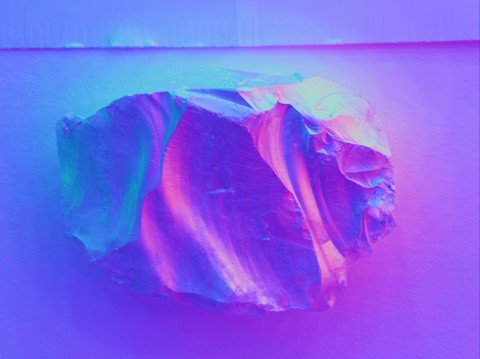
And a regular screen capture of the object’s other side here:
I also worked on several of my own digitisation projects, including handwritten letters from my Grandma as well as wedding photos from my Aunt. I worked on this alongside all of the projects at the Lab, and it was nice to digitise some of my own family history.
I found working as an intern at Digital Humanities an invaluable experience and recommend it to anybody looking for any experience in the field for job opportunities and personal experience. Don’t let lack of digital experience daunt you – the lab is very welcoming and provides all necessary training help to all interns!
Referenced Links
Early English Books Online (EEBO): https://www.proquest.com/eebo/index?parentSessionId=unTEUaEuRaIEPNHaUj3kn0BwSoOuc4xoiUyxeD1EVZ0%3D
Exeter Digital Humanities RTI demonstration Page: https://humanities-research.exeter.ac.uk/rti/
Famine Tales Twitter: https://twitter.com/faminetales/with_replies
The Hardy Correspondences: https://hardycorrespondents.exeter.ac.uk/about.html
Lawforms: https://humanities-research.exeter.ac.uk/lawforms/place.html?place=pgDhar

